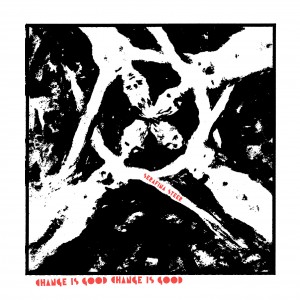Serafina Steer - Change Is Good, Change Is Good (Static Caravan)
An album that puts on a pedestal Serafina’s weird ability to tell captivating stories which so deftly link the 'kitchen sink' with the entirely mysterious...
Released May 27th, 2010 via Static Caravan / By Keiron Phelan
 The pilfering of harpist extraordinaire Serafina Steer’s principle instrument late one night and half way through the recording of this album was surely an upsetting experience for her, but should not overly alarm her fans. It seems to have galvanised her into completion of this excellent, much anticipated, follow up to her 2007 debut Cheap Demo, Bad Science (and supplied its anxiety ridden title to boot). Anyway, there’s harp a plenty for the diehards and the circumstances have given full reign to demonstrate her considerable keyboard abilities on a selection of pleasingly chunky synths. Most importantly it shines greater light upon her very real talent as a wordsmith, in which context she can only be regarded as a true, English, one-off.
The pilfering of harpist extraordinaire Serafina Steer’s principle instrument late one night and half way through the recording of this album was surely an upsetting experience for her, but should not overly alarm her fans. It seems to have galvanised her into completion of this excellent, much anticipated, follow up to her 2007 debut Cheap Demo, Bad Science (and supplied its anxiety ridden title to boot). Anyway, there’s harp a plenty for the diehards and the circumstances have given full reign to demonstrate her considerable keyboard abilities on a selection of pleasingly chunky synths. Most importantly it shines greater light upon her very real talent as a wordsmith, in which context she can only be regarded as a true, English, one-off.Accordingly, the adroit co-production by Benge and Capitol K adeptly pushes her vocals well to the fore here; a good call as Sefa’s lyrical world has a high event ratio and details that are well worth catching. It also has the merit of highlighting quite how, acrobatically, able a singer and melodicist Steer truly is (a fact somewhat occluded on 'Science'), particularly when in close harmony with backing vocalist Polly Huggett.
While there’s nothing here that quite reaches the heights of her first album’s standout, the superlative 'Peach Heart', it couldn’t start much better with the brace of 'Shut Up Shop' and 'GSOH'; the former being a stentorian almost Nicoesque lament for fading amour, beautifully couched in neo-gentile phrases and the latter simply a good, witty love song with a killer hook.
Elsewhere a tapestry of cleverly woven styles emerge; from the 'big folk tale' of 'The Sisters Of Proportion', via the elecro-folk fusion of 'How To Haunt A House Party', with its graceful, Kraftwerk like synth arpeggios, to the insanely catchy faux Euro pop of 'Margoton'. But, above all, rides Serafina’s weird ability to tell captivating stories which so deftly link the 'kitchen sink' with the entirely mysterious.
It’s rather difficult to know quite who Steer compares with. Change Is Good... places her slightly in Tunng territory, but her roots seem deeper and darker; their jocularity being replaced by a more mordant Ivor Cutler style of humour. Moreover, her intriguingly character rich, vignette style songs (though delivered in her trademark cool, English tones) contain a great deal more intimacy. In fact, this album could as easily have graced Rough Trade’s glorious early 80’s period of idiosyncratic releases as Static Caravan’s today. In conclusion, then, there’s no marking time here. This is a fine piece of work and not one that’s going to date.





 All Content RSS Feed
All Content RSS Feed
Follow Bearded on...